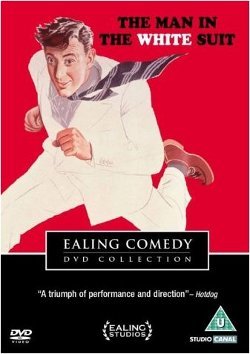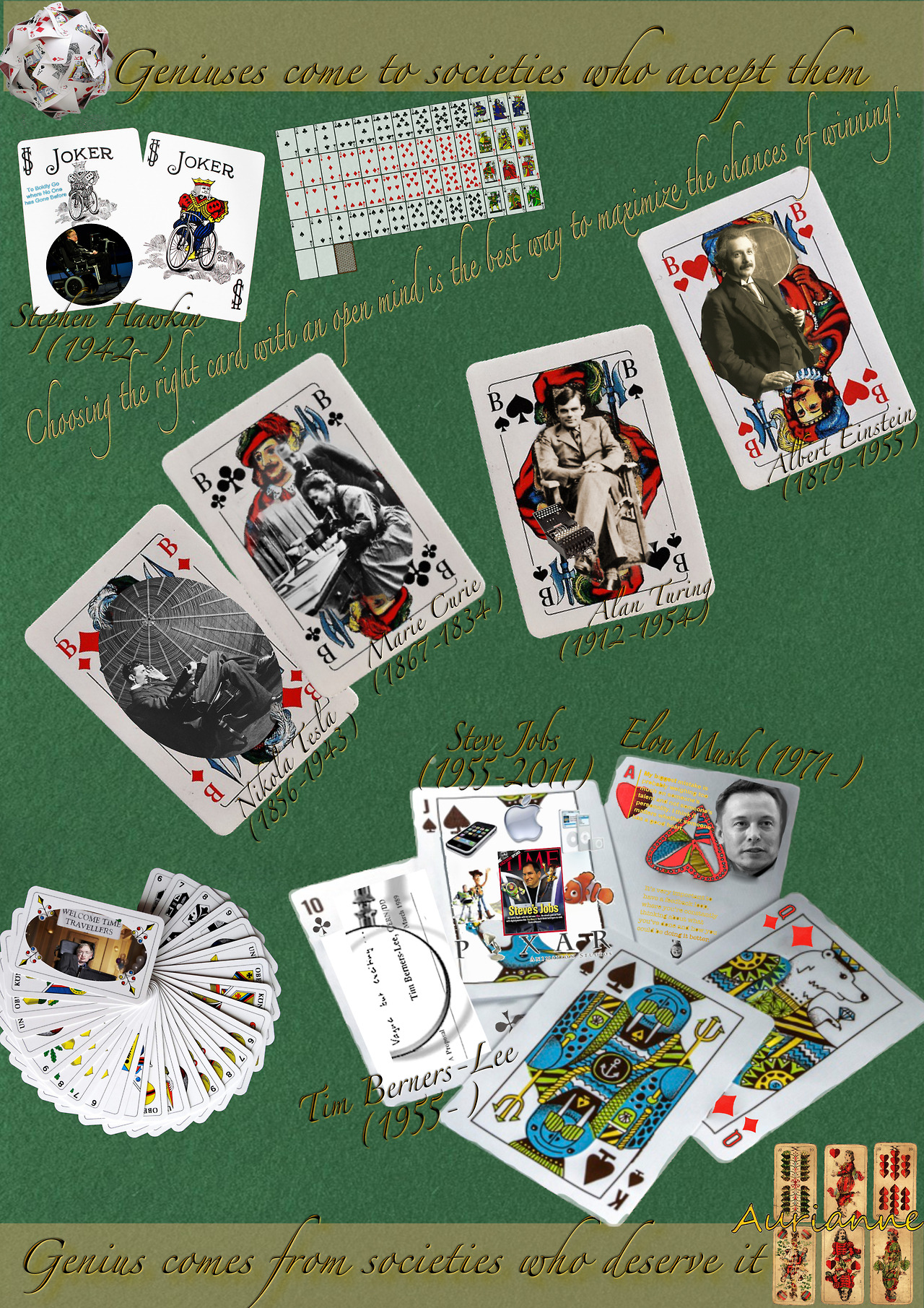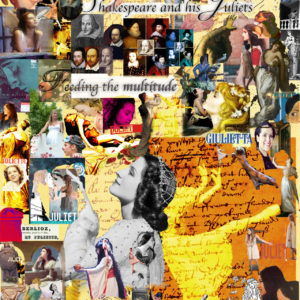Geniuses come to societies who accept them. Genius comes from societies who deserve it.
Choosing the right card with an open mind is the best way to maximize the chances of winning.
Albert Einstein (1879-1955)
Albert Einstein was born in Ulm, in the Kingdom of Württemberg in the German Empire.
Einstein developed the theory of relativity, one of the two pillars of modern physics (alongside quantum
mechanics). Einstein’s work is also known for its influence on the philosophy of science. Einstein is best known by the
general public for his mass–energy equivalence formula E = mc2 (which has been dubbed “the world’s most
famous equation”). He
received the 1921 Nobel Prize in Physics “for
his services to theoretical physics, and especially for his discovery of the
law of the photoelectric effect”, a
pivotal step in the evolution of quantum theory.
Near the beginning of his career,
Einstein thought that Newtonian mechanics was
no longer enough to reconcile the laws of classical mechanics with
the laws of the electromagnetic field. This led him to
develop his special theory of relativity during his time at the Swiss Patent Office in Bern (1902–1909),
Switzerland. However, he realized that the principle of relativity could also
be extended to gravitational fields and—with his
subsequent theory of gravitation in 1916—he published a paper on general relativity. He continued to deal with problems of statistical mechanics and quantum theory, which led to
his explanations of particle theory and the motion of molecules. He also investigated the thermal
properties of light which laid the foundation of the photon theory of light. In 1917, Einstein applied the
general theory of relativity to model the large-scale structure of the universe.
Between 1895 and 1914 he lived in
Switzerland (except for one year in Prague, 1911–12), where he received his
academic diploma from the Swiss Federal Polytechnic in
Zürich (later the Eidgenössische Technische Hochschule, ETH) in 1900. He later
taught there at the same institute as a professor of theoretical physics
between 1912 and 1914 before he left for Berlin. In 1901, after being stateless
for more than five years, Einstein acquired Swiss citizenship, which
he kept for the rest of his life. In 1905, Einstein was awarded a PhD by the University of Zürich. The same year, his annus mirabilis (miracle year), he published four groundbreaking papers, which were to bring him to the
notice of the academic world, at the age of 26.
He was visiting the United States
when Adolf Hitler came to power in 1933 and—being Jewish—did not go back to Germany, where he had been a
professor at the Berlin Academy of Sciences. In April
1933, Einstein discovered that the new German government had passed laws
barring Jews from holding any official positions, including teaching at
universities.
He settled in the United States,
becoming an American citizen in 1940. On the eve of World War II, he endorsed a letter to President Franklin D.
Roosevelt alerting him to the potential development of
“extremely powerful bombs of a new type” and recommending that the
U.S. begin similar research. This eventually led to what would become the Manhattan Project. Einstein supported defending the Allied forces, but generally denounced the idea of using
the newly discovered nuclear fission as a weapon.
Later, with the British philosopher Bertrand Russell,
Einstein signed the Russell–Einstein Manifesto, which
highlighted the danger of nuclear weapons. Einstein was affiliated with the Institute for Advanced Study in Princeton, New Jersey, until his death in 1955.
Einstein published more than 300 scientific papers along with over 150
non-scientific works. Einstein’s intellectual achievements and originality have
made the word “Einstein” synonymous with “genius”.
“Everybody is a genius. But if you judge a fish by its ability to climb a tree, it will live its whole life believing that it is stupid.” Albert Einstein
Marie Curie (1867-1834)
She was a Polish and naturalized-French physicist and chemist who
conducted pioneering research on radioactivity.
She was the first woman to win a Nobel Prize, the first person and only
woman to win twice, the only person to win a Nobel Prize in two
different sciences, and was part of the Curie family legacy of five Nobel Prizes. She was also the first woman to become a
professor at the University of Paris, and in 1995 became
the first woman to be entombed on her own merits in the Panthéon in Paris.
Stephen Hawking (1942-)
He is an English theoretical physicist, cosmologist, author and
Director of Research at the Centre for Theoretical
Cosmology within the University of Cambridge.
His scientific works include a collaboration with Roger
Penrose on gravitational singularity
theorems in the framework of general relativity and
the theoretical prediction that black holes emit radiation,
often called Hawking radiation. Hawking was the
first to set out a theory of cosmology explained by a union of the general
theory of relativity and quantum mechanics. He is
a vigorous supporter of the many-worlds interpretation of
quantum mechanics.
Hawking has a rare early-onset,
slow-progressing form of amyotrophic lateral sclerosis (ALS)
that has gradually paralysed him over the decades. He now communicates using a
single cheek muscle attached to a speech-generating device.
Steve Jobs (1955-2011)
He was an American entrepreneur,
businessman, inventor, and industrial designer. He was the co-founder,
chairman, and chief executive officer (CEO) of Apple Inc.; CEO and majority shareholder of Pixar; a member of The Walt Disney Company’s
board of directors following its acquisition of Pixar; and founder, chairman,
and CEO of NeXT. Jobs and Apple co-founder Steve Wozniak are widely recognized as pioneers of the microcomputer revolution of the 1970s and 1980s.
He was an adopted child, then a
hippy, a Zen Buddhist and a demanding-perfectionist entrepreneur, often
described as a megalomaniac. He had very scarce relations with his daughter. He lived on a fruitarian diet.
Tim Berners-Lee (1955-)
Vague but exciting
Alan Turing (1912-1954)
He was an English computer
scientist, mathematician, logician, cryptanalyst, philosopher and theoretical biologist. Turing is widely considered to be the
father of theoretical computer science and artificial intelligence.
Turing played a pivotal role in
cracking intercepted coded messages that enabled the Allies to defeat the Nazis
in many crucial engagements, including the Battle of the Atlantic,
and in so doing helped win the war.
At the upper end it has been estimated that this work shortened the war in Europe by more than two years and saved over fourteen million lives.
He did not speak German. He had difficulties relating to other
people on a daily basis, including his wife and colleagues.Turing was prosecuted in 1952 for
homosexual acts and killed himself.
Elon Musk (1971-)
He is a South African-born
Canadian-American business magnate, investor, engineer, and inventor. He has a slight stutter.
He is the founder of SpaceX and
co-founder of Zip2 and PayPal. He proposed a new mode of transport called
Hyperl∞p. In 2012 SpaceX replenishes the International Space Station.
At the end of 2013, he was aiming to
create a supersonic electric aircraft that could take off and land vertically
and found a colony of 1,000,000 people on Mars13.
In December 2015, Space X realized
the first recovery of the first stage of its rocket Falcon 9.
In 2015, he co-founded and co-chaired
OpenAI, a non-profit research association in artificial intelligence whose
objective was to promote and develop an open-source AI benefiting mankind as a
whole. In 2016 he founded the Neuralink startup, which aims to link the brain
to printed circuits in order to merge human and artificial intelligences
He has controlled and managed Tesla cars since 2008. Musk wants to produce accessible electric vehicles.
In December 2016 Elon Musk founded a
new company, The Boring Company. The aim of this project is to eliminate
traffic jams in large cities by installing a network of underground roads.
He has proved to live in an environment who allowed him to think big and disruptive. Despite his far-right ideas, one must acknowledge his flair in investing in projects of other people, before he used his fortune to get power by buying Twitter…
Elon Musk: Last Week Tonight with John Oliver (HBO): https://youtu.be/Eo3zORUGCbM?si=TUxpdymb6rV3Xd2x
Nikola Tesla
He was born and raised in the
Austrian Empire. He received an advanced education in engineering and physics
in the 1870s and gained practical experience in the early 1880s working in telephony and at Continental Edison in the new electric power industry. He emigrated to the United States
in 1884, where he would become a naturalized citizen.
He worked for a short
time at the Edison Machine Works in New York City before he struck
out on his own. With the help of partners to finance and market his ideas,
Tesla set up laboratories and companies in New York to develop a range of
electrical and mechanical devices. His alternating current (AC) induction motor and related polyphase AC patents, licensed by Westinghouse Electric in 1888, earned him a
considerable amount of money and became the cornerstone of the polyphase system
which that company would eventually market.
Having spent most of his money, he
lived in a series of New York hotels, leaving behind unpaid bills. The nature
of his earlier work and the pronouncements he made to the press later in life
earned him the reputation of an archetypal “mad scientist” in
American popular culture.
Jacques Necker
He was a Swiss banker who became a French statesman and finance minister for Louis XVI. He warned him about the dangers he was threatened with and advised him to give local power to elected parliaments and establish transparency at all levels of the States with “lettres au Roi” because most of the money from public taxes evaded. He said Louis XVI did not need to borrow money as the country was already rich.
For further information, please visit
Wikipedia or any source of information thoroughly.
“If you believe that genius is this thing that can be cultivated and nurtured, what an incredible tragedy that thousands of potential geniuses have withered and died” Darrin macMahon, historian

The Man in the White Suit: https://en.wikipedia.org/wiki/The_Man_in_the_White_Suit



